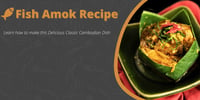fish amok recipe
Fish Amok is a traditional Cambodian dish that is believed to have originated in the ancient Angkorian period. The dish is made by steaming a mixture of fish, herbs, spices, and coconut milk, wrapped in banana leaves. This Fish Amok Recipe is usually served with a side of rice, and is often considered to be the national dish of Cambodia. The main ingredient of Fish Amok is usually a whitefish, such as tilapia, but catfish and other varieties of fish can also be used. The other ingredients in this Fish Amok recipe include lemongrass, galangal, garlic, shallots, turmeric, coconut milk, and kaffir lime leaves, which all contribute to the unique flavor of the dish. The banana leaves are used to keep the steam inside and also impart a subtle flavor to the dish.
To make the Cambodian Fish Amok recipe, the fish is cut into cubes and set aside. In a food processor, lemongrass, garlic, galangal, shallots, and kaffir lime leaves are blended until they form a paste. The coconut milk is then heated in a large pot, and the paste from the food processor is added and stirred for a few minutes. Turmeric , fish sauce, chili paste, and sugar are then added to the pot and stirred until fully combined. The fish cubes are added to the mixture and simmered for 10 minutes. The dish is then served with steamed rice and garnished with chopped cilantro and toasted shredded coconut.
The Cambodian Fish Amok recipe differs from the UK Fish Amok recipe, which typically includes a fillet of fish cooked with a creamy curry sauce and served with rice. The Cambodian version is spicier and more flavorful due to the use of fragrant herbs and spices, such as lemongrass, galangal, and kaffir lime leaves. The use of banana leaves to wrap and steam the fish also adds a unique aroma and flavor to the dish.
For those interested in learning how to make Fish Amok in Cambodia, there are cooking classes available in Siem Reap where participants can learn how to choose the freshest ingredients at the local market, marinate the fish, and wrap it in banana leaves before steaming. These classes also provide an opportunity to learn more about local Cambodian cuisine and culture.
